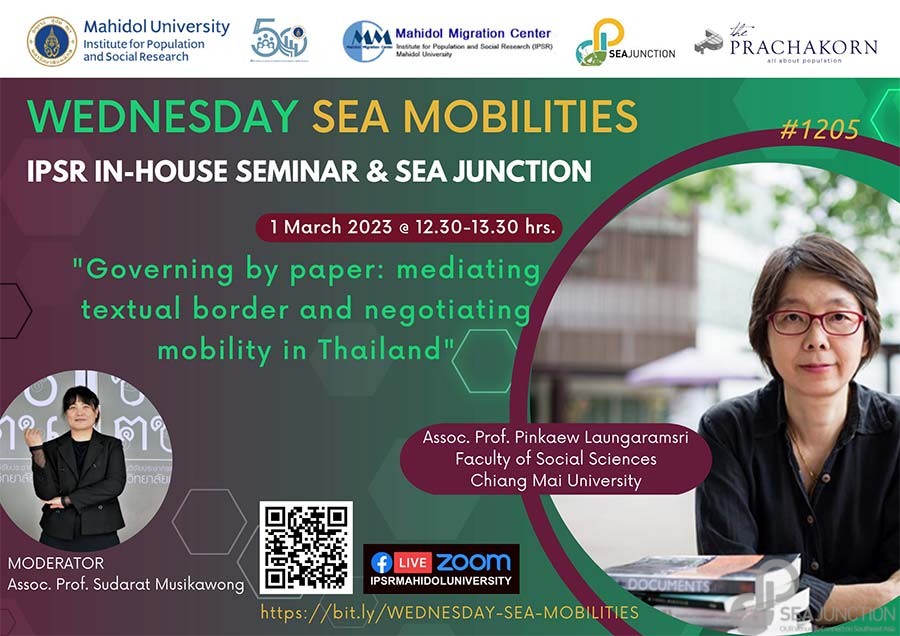
- This event has passed.
Governing by Paper: Mediating Textual Border and Negotiating Mobility in Thailand
1 March, 2023 @ 12:30 pm - 1:30 pm
SEA Junction in collaboration with IPSR In-House Seminar and Mahidol Migration Centre (MMC) has launched a series of bi-monthly events entitled ‘Wednesday SEA Mobilities’, starting in February 2022. The last Wednesday of every two months we will jointly hold seminars or panels discussing vast arrays of current Southeast Asia’s mobility issues by experts, academics, practitioners, NGO workers, migrants, and people from the fields. Our next session will be on 1 March 2023 at 12.30-1.30 pm
Our next event on 1 March 2023 at 12.30-1.30 pm will be a presentation by Professor Pinkaew Luangaramsri on her article “Governing by paper: mediating textual border and negotiating mobility in Thailand”. The online event will be broadcast on Zoom at https://bit.ly/WEDNESDAY-SEA-MOBILITIES and also on the FB pages of IPSR and of SEA Junction.
Article’s Abstract
The relationship between border and bureaucracy offers fertile ground to study how the border continues to affect the lives and movement of people. As epistemological and material sites, borders and their document networks work to produce categories of people. The production of border documents also creates various forms of mediator that traverse in and outside the state arena. Such fluidity of the documentary traffic thus generates a subversive economy that facilitates an unauthorized mobility, which undermines the efficiency of the state document itself. While the anthropology of border attempts to redefine the border’s spatio-temporality through examining border practices, state and border crossing populations remain the key actors. This article attempts to move away from the duality of the relationship between state and border dweller by investigating the politics of border mediation. It argues that bureaucratic ID documentation in Thailand has been a significant tool that not only defines the migrants, but also shapes the way in which the border is (re)made. While the aim of the bureaucratic document is to serve the state’s objective of border control, the circulation of documents has created extra-state industries, such as extortion, bribery and brokerage, that allow the fluid labourscape to flourish.
Speaker’s Profile
Pinkaew Laungaramsri is Assistant Professor of Anthropology in the Department of Sociology and Anthropology, Chiang Mai University. Her research interests include politics of nature conservation, the rights of upland minorities, border studies, women’s movements, development critiques, and social movements. She has extensive experience in the fields of ethnic minority rights, upland livelihood and conservation, gender and transnational movements, and the political movement of local people in northern Thailand.

Organizers
SEA Junction, established under the Thai non-profit organization Foundation for Southeast Asia Studies (ForSEA), aims to foster understanding and appreciation of Southeast Asia in all its socio-cultural dimensions, from arts and lifestyles to economy and development. Conveniently located at Room 408 of the Bangkok Arts and Culture Center or BACC (across MBK, BTS National Stadium), SEA Junction facilitates public access to knowledge resources and exchanges among students, practitioners and Southeast Asia lovers. For more information, see www.seajunction.org, join the Facebook group: http://www.facebook.com/groups/1693058870976440/ and follow us on Twitter and Instagram @seajunction
Institute for Population and Social Research (IPSR), Mahidol University was established in 1971 and has become one of Asia’s premier population research and training hubs. The Institute conducts research and provides training in population, sexual and reproductive health and development with a focus on Thailand and on neighbouring countries in Southeast Asia, with the ultimate goal of improving the quality of life for all. For more information, see https://ipsr.mahidol.ac.th.



